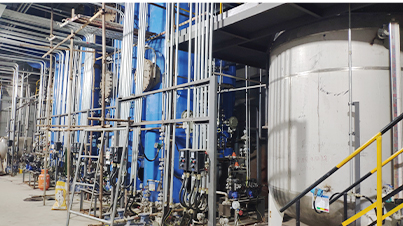limescale inhibitor
Understanding Limescale Inhibitors A Comprehensive Guide
Limescale is a common household nuisance caused by hard water. When hard water evaporates, it leaves behind deposits of calcium and magnesium, which can build up over time in plumbing, appliances, and fixtures. This buildup not only leads to unsightly stains but also reduces the efficiency of appliances, increases energy bills, and can even lead to costly repairs. To combat this problem, many homeowners turn to limescale inhibitors. This article explores what limescale inhibitors are, how they work, and their benefits.
What are Limescale Inhibitors?
Limescale inhibitors are substances or technologies used to prevent the formation and accumulation of limescale in water systems. They do not remove existing limescale but instead inhibit its formation by altering the properties of the minerals dissolved in hard water. Limescale inhibitors can come in various forms, including chemical additives, magnetic devices, and electronic descalers.
How Limescale Inhibitors Work
The primary mechanism through which limescale inhibitors function is by modifying the crystallization process of calcium carbonate, the main component of limescale. Rather than allowing the minerals to crystallize into large, hard deposits, limescale inhibitors promote the formation of smaller, less harmful particles that remain suspended in the water. These smaller particles can be easily flushed away through normal water flow.
1. Chemical Inhibitors These substances, often phosphonates or polycarboxylates, are added to water systems and act by chemically binding to calcium and magnesium ions, preventing them from combining and forming limescale.
2. Magnetic Devices These devices are installed on plumbing lines and use a magnetic field to alter the properties of the calcium and magnesium ions in the water. This alteration helps prevent the minerals from crystallizing into solid deposits.
3. Electronic Descalers Similar to magnetic devices, electronic descalers employ electromagnetic waves to change the water's properties. They can reduce limescale buildup without the need for chemicals.
limescale inhibitor

Benefits of Using Limescale Inhibitors
Using limescale inhibitors offers several benefits that can lead to improved home maintenance and reduced costs over time
1. Maintenance Reduction By preventing limescale buildup, these inhibitors reduce the frequency and intensity of cleaning needed for faucets, showerheads, and fixtures. This not only saves time but also prolongs the lifespan of appliances.
2. Increased Efficiency Limescale can significantly impair the efficiency of water heaters, dishwashers, and washing machines. By minimizing limescale formation, inhibitors help ensure that these appliances operate efficiently, leading to lower energy consumption and costs.
3. Cost Savings While there may be an initial investment in limescale inhibitors, the long-term savings on repair costs, energy bills, and cleaning products can be significant. Additionally, extending the life of crucial appliances adds to the overall cost-effectiveness.
4. Environmentally Friendly Many limescale inhibitors are environmentally safe, limiting the need for harsh chemicals that can harm plumbing and the environment. Electronic and magnetic solutions provide chemical-free options for tackling limescale.
5. Improved Water Quality Inhibitors can contribute to better water quality by preventing the dislodging of existing limescale, which can lead to cloudy or unpleasant-tasting water.
Conclusion
Limescale inhibitors are an effective solution for homeowners dealing with the challenges posed by hard water. By understanding the mechanisms and benefits of these inhibitors, you can make informed decisions to enhance your home's plumbing system. Whether through chemical additives, magnetic devices, or electronic descalers, the right limescale inhibitor can significantly improve the efficiency and durability of your appliances, saving you time and money while maintaining the quality of your water. Integrating limescale inhibitors into your home maintenance routine is a proactive approach to ensuring a cleaner, more efficient environment.
-
Water Treatment with Flocculant Water TreatmentNewsJun.12,2025
-
Polymaleic AnhydrideNewsJun.12,2025
-
Polyaspartic AcidNewsJun.12,2025
-
Enhance Industrial Processes with IsothiazolinonesNewsJun.12,2025
-
Enhance Industrial Processes with PBTCA SolutionsNewsJun.12,2025
-
Dodecyldimethylbenzylammonium Chloride SolutionsNewsJun.12,2025





